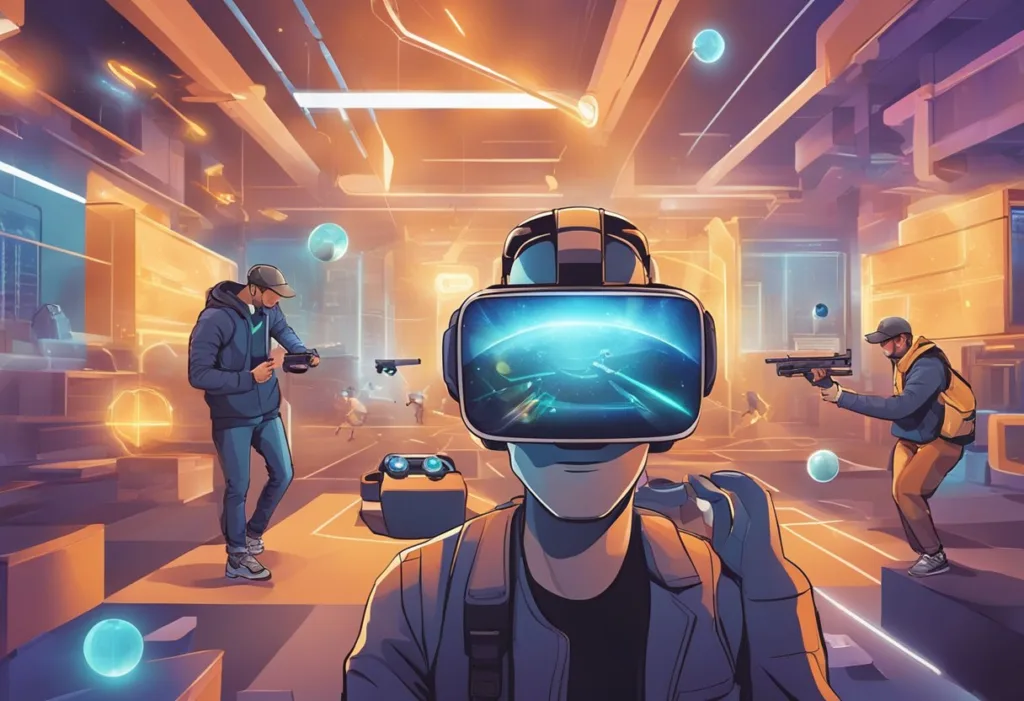Metaverse software development has become a hot topic in the tech industry, with many companies investing resources into creating immersive virtual worlds that integrate virtual reality (VR), augmented reality (AR), and extended reality (XR) technologies. The metaverse is a virtual space where users can interact with each other and digital objects in a shared environment. It is being pursued by major tech companies such as Meta, Microsoft, and Activision Blizzard, and is expected to be the next big thing in computing.
Developing applications for the metaverse involves creating games or experiences for a variety of platforms, including VR systems like the Oculus Quest and HTC Vive, gaming consoles like Playstation and Xbox, mobile apps, and emerging virtual worlds like Roblox and Fortnite.
Metaverse developers need to have skills in creating digital and immersive worlds that users can communicate with, using technologies such as VI, AR, and AI. The metaverse will be shaped by the technology used to access it, which could include VR, AR, and brain-computer interfaces.
As the metaverse becomes more mainstream, businesses and developers need to understand the current challenges and opportunities in metaverse software development.
This includes understanding the technical requirements for creating metaverse applications, as well as the potential impact on software development as a whole. With the metaverse expected to revolutionize how we interact with digital content, metaverse software development is becoming an increasingly important field for developers and businesses alike.
Fundamentals of Metaverse Software Development
What is Metaverse Software
Metaverse software is a type of software that enables users to create, interact with and experience virtual worlds. It is a combination of various technologies such as AI, game engines, blockchain, open source and SDks. The software allows users to create their own virtual worlds, explore others and interact with other users in a shared virtual space.
Metaverse Developer Opportunities
Metaverse software development offers a wide range of opportunities for developers. They can work on creating virtual worlds, developing AI systems, designing user interfaces and developing blockchain-based systems. The demand for metaverse developers is increasing as more businesses and individuals are looking to create virtual experiences.
How Much Does it Cost to Build a Metaverse
The cost of building a metaverse varies depending on the complexity of the project. A basic virtual world can be created for a few thousand dollars, while more complex projects can cost millions of dollars. The cost is affected by factors such as the size of the virtual world, the level of interactivity, the quality of graphics and the complexity of the AI systems.
Metaverse Development Companies List
There are several companies that specialize in metaverse development. These companies offer services such as virtual world creation, AI development, blockchain integration and user interface design. Some of the popular metaverse development companies include Unity Technologies, Unreal Engine, and Meta.
What Does it Take to Create a Metaverse
Creating a metaverse requires a combination of various skills and technologies. Developers need to have knowledge of game engines, AI systems, blockchain technology, open source software and SDks.
They also need to have skills in designing user interfaces, creating 3D models and developing immersive experiences. They need to have a strong understanding of the needs and preferences of their target audience.
Metaverse software development is a complex and exciting field that offers a wide range of opportunities for developers. With the increasing demand for virtual experiences, the demand for metaverse developers is expected to grow in the coming years.

Metaverse Platforms and Ecosystems
Metaverse software development involves creating digital environments that can be experienced synchronously and persistently by an unlimited number of users. Different companies have developed their metaverse platforms to provide users with different experiences.
Major Metaverse Platforms
Some of the major metaverse platforms include Roblox, Decentraland, Second Life, Horizon Workrooms, and The Sandbox. Roblox is a popular platform that allows users to create and play games in a 3D virtual environment. Decentraland is an open-source platform that allows users to create and monetize their virtual worlds.
Second Life is a virtual world that has been in existence since 2003, and it enables users to create and interact with other users in a 3D environment.
Horizon Workrooms is a virtual reality platform developed by Facebook that allows users to hold meetings in a virtual environment. The Sandbox is a blockchain-based platform that enables users to create and monetize their virtual worlds.
Ecosystem Interoperability
Metaverse ecosystems are interoperable meta-ecosystems of other digital ecosystems of real-time rendered 3D virtual worlds.
Microsoft, Facebook, Nvidia, and Apple are some of the tech companies that have adopted metaverse software development. These companies have developed their metaverse platforms and ecosystems to provide users with different experiences.
Developers must ensure that their metaverse applications are compatible with different platforms to provide users with a seamless experience. Interoperability is essential in metaverse software development to ensure that users can access different platforms without any compatibility issues.
Metaverse software development involves creating digital environments that can be experienced synchronously and persistently by an unlimited number of users. Different companies have developed their metaverse platforms to provide users with different experiences. Developers must ensure that their applications are compatible with different platforms to provide users with a seamless experience.
User Interaction and Experience
Creating Immersive Avatars
One of the key features of metaverse software development is the ability to create immersive avatars. These avatars are digital representations of the user that allow them to interact with the virtual world in a more natural and intuitive way. The design of these avatars is crucial to the overall user experience, as it can greatly impact how users engage with the metaverse.
Designers must consider various factors when creating avatars, such as movement, appearance, and customization. Movement is important to ensure that the avatar moves in a way that feels natural to the user. Appearance is also crucial, as users want their avatars to look and feel unique. Customization options allow users to personalize their avatars, which can increase engagement and user satisfaction.
Designing for User Engagement
Designing for user engagement is another important aspect of metaverse software development. The goal is to create an experience that is both immersive and engaging, which can be achieved through various design strategies. For example, designers can use VR headsets to create a more immersive experience, or AR experiences to enhance the user’s interaction with the virtual world.
Another important aspect of designing for user engagement is the use of 3D avatars. These avatars allow users to interact with the virtual world in a more natural and intuitive way, which can increase engagement and user satisfaction. Designers must also consider the user experience when designing for engagement, as it is important to create an experience that is both enjoyable and intuitive.
Creating immersive avatars and designing for user engagement are crucial aspects of metaverse software development. By considering factors such as movement, appearance, customization, VR headsets, AR experiences, and 3D avatars, designers can create an experience that is both immersive and engaging for users.
Metaverse for Business and Education
The metaverse is a virtual space that has the potential to revolutionize the way businesses operate and how people learn. With the advancement of technology, it is now possible to create immersive virtual worlds that can be used for various applications, including gaming, retail, education, manufacturing, workspaces, healthcare, training, and collaboration.
Enterprise Solutions in the Metaverse
The metaverse can provide a unique opportunity for businesses to create new solutions that can help them operate more efficiently and effectively. With the metaverse, businesses can create virtual workspaces, where employees can collaborate and communicate in real-time, regardless of their location. This can help reduce travel costs and improve productivity.
In addition, the metaverse can be used to create virtual showrooms, where customers can interact with products and services in a more immersive and engaging way. This can help businesses improve their sales and marketing efforts, as well as provide a more personalized experience for their customers.
Educational Opportunities
The metaverse can also provide new opportunities for education and training. With the metaverse, educators can create virtual classrooms, where students can learn in a more engaging and interactive way. This can help improve student engagement and retention, as well as provide a more personalized learning experience.
Moreover, the metaverse can be used to create virtual labs, where students can conduct experiments and simulations in a safe and controlled environment. This can help reduce the cost of equipment and materials, as well as provide a more immersive learning experience.
The metaverse has the potential to transform the way businesses operate and how people learn. As technology continues to advance, it is likely that we will see more applications of the metaverse in various industries.

Security and Privacy in the Metaverse
As the Metaverse expands and gains widespread attention from users, privacy and security issues come to the forefront. In this section, we will discuss how metaverse software development can ensure the protection of user data and mitigate security threats.
Protecting User Data
One of the biggest concerns in the Metaverse is the protection of user data. With the increasing amount of data integration and user profiling activities, there is a high risk of privacy invasion. Metaverse software developers must ensure that user data is collected, stored, and processed securely, with the user’s consent and knowledge.
To protect user data, metaverse software must use secure data encryption and authentication mechanisms. Developers must implement user access controls and data sharing policies to ensure that only authorized users can access and share data. Metaverse software must also comply with privacy regulations and standards to ensure user data is protected at all times.
Mitigating Security Threats
Metaverse software development must also mitigate security threats to ensure the safety of users and their data. Cybersecurity threats such as hacking, phishing, and malware attacks are a major concern in the Metaverse. Developers must implement robust security measures to prevent unauthorized access and malicious activities.
To mitigate security threats, metaverse software must use secure authentication mechanisms, such as multi-factor authentication, to ensure that only authorized users can access the system. Developers must also implement security protocols to protect against hacking and malware attacks.
Metaverse software must be designed with security in mind, and security testing must be conducted regularly to identify and address vulnerabilities.
Metaverse software development must prioritize security and privacy to ensure the safety of users and their data. By implementing secure data encryption, user access controls, and security protocols, developers can mitigate security threats and protect user data from privacy invasion.
Frequently Asked Questions
What are the essential skills required for a career in metaverse development?
Metaverse development requires a combination of technical and creative skills. A solid understanding of programming languages, game engines, and 3D modeling is necessary. Proficiency in game design, user experience, and user interface design is essential. An ability to think creatively and critically is also important.
Which programming languages are most commonly used in metaverse development?
Metaverse development involves a variety of programming languages. Some of the most commonly used languages include C++, C#, Java, JavaScript, and Python. Other languages such as Go, Rust, and Lua are also used in some metaverse development projects.
What tools and technologies are prevalent in metaverse software creation?
The tools and technologies used in metaverse development depend on the specific project and platform. Some of the commonly used tools include game engines such as Unity and Unreal Engine, 3D modeling software such as Blender and Maya, and virtual reality and augmented reality devices such as Oculus Rift and HoloLens. Blockchain technology and Web 3.0 protocols are also becoming increasingly prevalent in metaverse development.
How can one start a career as a metaverse developer and what is the typical learning path?
To start a career in metaverse development, one should obtain a degree in computer science, game development, or a related field. Building a portfolio of projects that demonstrate proficiency in programming, game design, and 3D modeling is also important. Participating in hackathons and game jams can also be helpful. Learning from online resources such as tutorials, forums, and online courses can also be beneficial.
What is the average salary range for a metaverse developer in the United States?
The average salary range for a metaverse developer in the United States varies depending on the location, experience, and specific job role. According to Glassdoor, the average salary for a metaverse developer in the United States is approximately $95,000 per year.
Which companies are considered leaders in metaverse development?
Several companies are considered leaders in metaverse development, including Facebook (Meta), Roblox, Epic Games, Unity Technologies, and Niantic. These companies are at the forefront of developing metaverse platforms and technologies that are shaping the future of immersive experiences.














